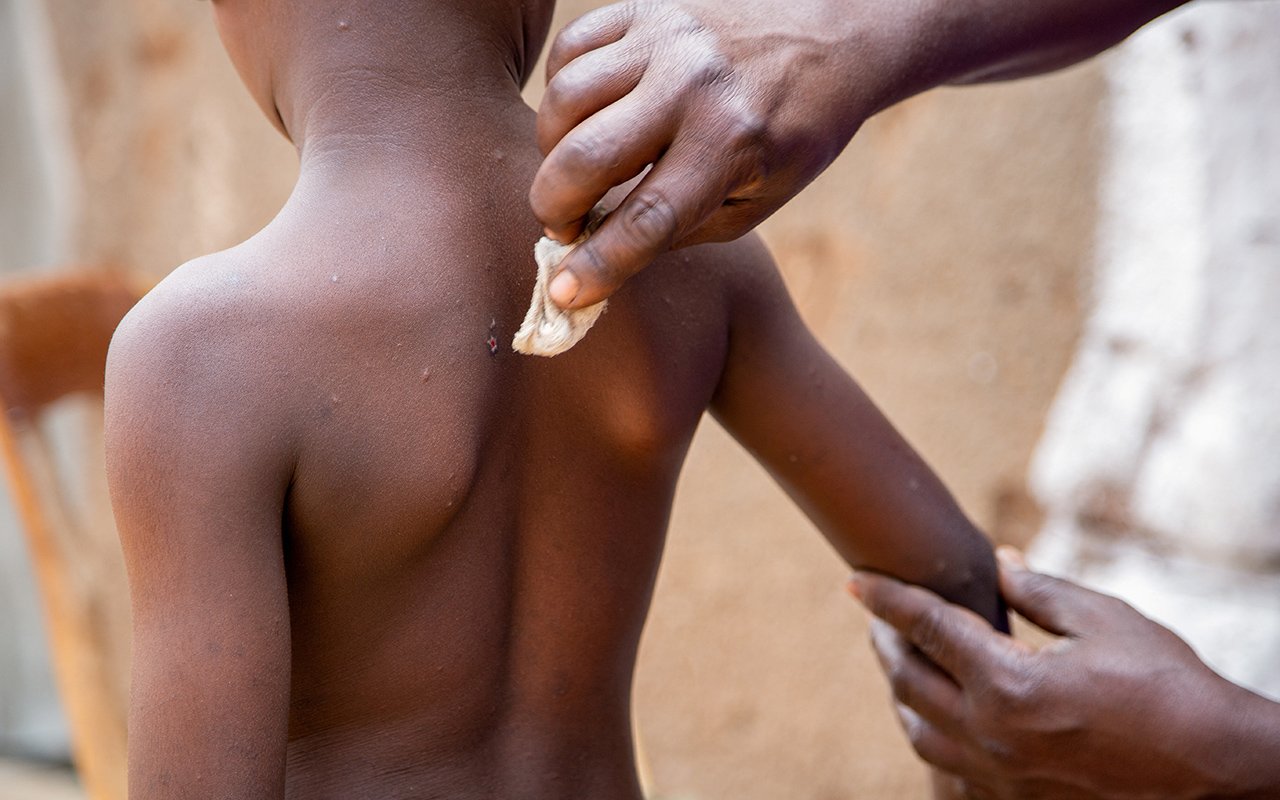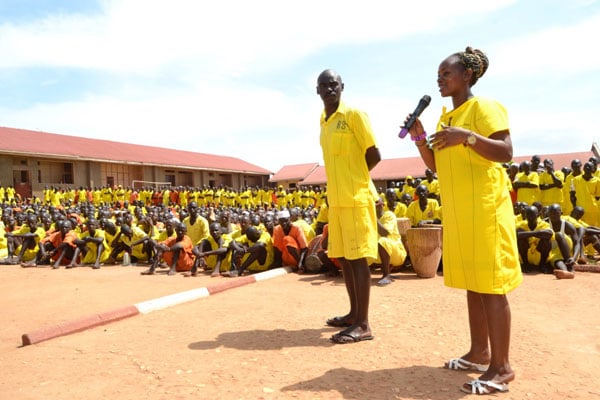
A man shows the marks on the skin of his six-year-old son after he recovered from mpox in Bujumbura, Burundi on August 28, 2024. PHOTO/ REUTERS
Health officials have cited the rapid spread of monkeypox (Mpox) disease across the country and limited funding as major challenges in containing the disease.
Uganda, which discovered the first two cases of Mpox on July 24 in Kasese District, has since overtaken Nigeria as the third African country with the highest number of confirmed cases.
In less than three months, the cases have shot up to 104 in the 12 districts of Kampala, Adjumani, Amuru, Kagadi, Kasese, Masindi, Mayuge, Mityana, Mukono, Nakaseke, Wakiso and Nakasongola, with fears that the cases may rise higher.
October 14 statistics from the Ministry of Health show that Kampala and Nakasongola are leading with 29 cases each, followed by Wakiso with 16 cases, while the rest of the districts have less than 10 cases each.
Lt Col Dr Henry Kyobe, the national Mpox incident commander, told delegates during a meeting on Mpox response and Marburg readiness on Tuesday that the rapid spread of the disease to several parts of the country poses a big risk despite not registering a single death.
Mpox, he said, has also spread to some schools in Wakiso District. He, however, added that no school would be closed because the learners are still struggling to catch up with the time lost during the Covid-19 outbreak.
“We are aiming to manage school clusters differently, including identification and isolation of learners that have symptoms, identifying contacts and following them up. Where there are a big number of learners with symptoms, we shall not close the whole school. We may close the affected classes and ensure we keep the schools open,” he said.
The World Health Organisation (WHO) defines Mpox as an acute viral illness with fever, headache, lymph node enlargement, back pain, and myalgia, followed by a progressively developing rash often beginning on the face (most dense) and then spreading elsewhere on the body and soles of feet and palms of the hand.
Dr Annette Alenyo Ngabirano, the WHO technical officer of case management and infection prevention and control in Uganda, said the main mode of Mpox transmission is through sexual intercourse with an infected person. It can also be passed on through person-to-person body contact through handshake, and kissing, among others.
WHO, she said, recommends at least three months of condom use after discharge for sexually active people.
The latest multi-country external situation report published by the WHO on October 13, indicates that 106,310 Mpox cases were registered between January 2022 and October 2024.
The report said Africa accounts for 7,535 cases of these, while the Democratic Republic of Congo (DRC) tops with 6,169 cases, followed by Burundi with 987, and Uganda overtaking Nigeria at third position with 104 cases as of October 14.
In Nakasongola, one of the districts with the highest cases, 50 percent of Mpox patients, health officials said are battling genital ulcers, a symptom linked to the mode of disease transmission.
While the skin rash symptom is most predominant and listed at 86 percent, the genital ulcers located on the genital area, medics said present with painful open sores and perhaps explain the likely cause by sexual transmission.
Dr Agaba Byamukama, the Nakasongola District health officer, said: “It is true that we have many of our patients battling genital ulcers. It is surprising that more than half of the Mpox cases have presented the genital ulcers. For cases, including the five sex workers, it is clear that genital ulcers can be linked to sexual transmission.”
Dr Jonathan Kanoonya, a senior gynaecologist at the Mpox treatment unit at Nakasongola Health Centre IV, said the sores caused by Mpox are large, pus-filled bumps.
“When the small bumps burst open, they cause an ulcer and the large sores that harbour a secondary bacterial infection on the genital area. We highly suspect that the bacteria is the haemophilus ducreyi, spread through sexual contact,” he said.
The US Mission in Uganda yesterday announced via its official X handle, that the US government is providing $4.1m (Shs14.9b) and 5,500 Mpox test kits to support Uganda’s efforts to stop Mpox.
This announcement came a day after Ms Christabel Abewe, the health financing officer at WHO, informed the delegation in Kampala that a total of 17 partners had so far mobilised $4.1m (about Shs14.9b) out of the expected $6.5m (Shs23.7b).
At the Kampala event, the UN Resident Coordinator in Uganda, Ms Susan Ngogi Namondo, tasked the global health community and international partners, to support Uganda’s Mpox response, to bring the outbreak under control.
“I appeal to the global health community and partners to work with Uganda to ensure that vaccines and medical supplies are available, affordable and accessible to those who need them the most, especially in rural areas and among the at-risk groups,” Ms Namondo said.
Speaking at the function, government officials led by Health minister Ruth Aceng resolved to increase funding towards the national response to ease implementation of different interventions.
The interventions include vaccination, provision of community essential services, water and sanitation, strategic information, research and innovation, case management, infection prevention and control, community engagement and social protection, logistics, coordination, surveillance, risk communication and mobilisation, and enhancing laboratory services.
Dr Aceng said the Centers for Disease Control Africa have committed to offer 2,000 doses of Mpox vaccine to Uganda.


